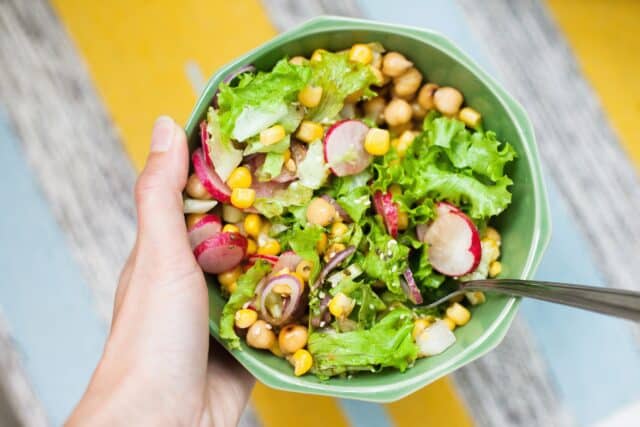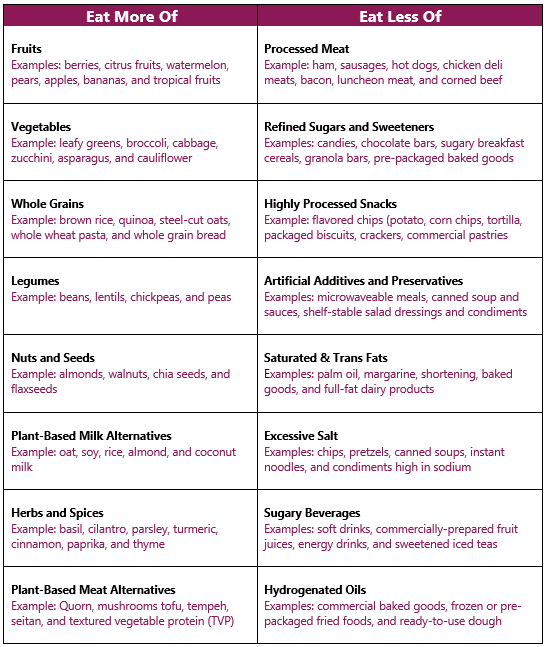
The modern diet, which includes many animal products and processed foods, contributes to various health problems like heart disease, obesity, digestive issues, and fatigue. If you’re feeling the adverse effects of these dietary choices and want to make a positive change, a plant-based diet could be the solution you’ve been looking for.
Delve deeper into what a plant-based diet is and discover its benefits on your overall health.
What Is a Plant-Based Diet?
A plant-based diet is a way of eating that primarily centers around foods derived from plants. It involves consuming various fruits, vegetables, legumes, whole grains, nuts, and seeds while minimizing or excluding animal-based products like meat, dairy, and eggs.
The fundamental principle behind plant-based diets is to focus on whole, minimally processed foods that provide essential nutrients without unnecessary additives or preservatives.
What Should I Eat on a Plant-Based Diet?
Adopting a plant-based diet doesn’t mean limiting your food choices. In fact, it opens up a world of delicious and nutritious options. Whether you’re new to plant-based eating or looking to explore more plant-derived foods, here’s a diverse selection of foods that you can enjoy on a plant-based diet:

The Best Health Benefits of Going Plant-Based
A well-balanced plant-based diet can pave the way to a healthier and more fulfilling lifestyle. Here are the ten best plant-based diet benefits:
1. Nutritional Advantages
Plant-derived foods are rich in vitamins, minerals, and antioxidants, crucial for supporting various bodily functions and maintaining optimal well-being. In addition, their high fiber content promotes smooth digestion and improves gut health.
2. Better Heart Health
One of the standout advantages of a plant-based diet is its positive impact on cardiovascular health. They are naturally low in unhealthy saturated and trans fats, high in fiber, and loaded with antioxidants. This combination helps reduce blood pressure, decrease inflammation, and lower LDL cholesterol (the ‘bad’ cholesterol), all risk factors for heart disease.
3. Weight Management
Whole plant foods, inherently high in fiber, promote a feeling of fullness and satiety, making it easier to control your appetite and reduce the likelihood of overeating. Additionally, they contain fewer calories and fats than processed and animal-based foods. It can lead to an energy deficit, causing the body to use stored fat, leading to weight loss.
Moreover, certain plant foods, such as spicy peppers, can boost your metabolism as they contain capsaicin—a compound that increases metabolic rate.
4. Good Gut Health
The fiber in plant-based foods adds bulk to your diet, aids in regular bowel movements, and helps prevent constipation. Besides, dietary fiber foods feed the healthy bacteria in your gut, leading to a robust gut microbiome that contributes significantly to overall health.
5. Healthy Skin
Plant-based foods are rich in antioxidants and essential vitamins, such as A, C, and E, which help combat oxidative stress and inflammation. These nutrients contribute to skin health by reducing the risk of skin issues like acne and promoting a radiant and glowing complexion.
6. Blood Sugar Regulation
Plant-based diets are also highly beneficial for those managing diabetes. Foods high in fiber slow down the absorption of sugars into your bloodstream, preventing spikes in blood sugar levels. Moreover, plant-based diet staples, such as whole grains, legumes, fruits, and vegetables, have lower glycemic indexes than processed foods.
7. Positive Impact on Mental Health
Beyond physical health benefits, a plant-based diet can positively impact mental well-being. Nutrients such as B vitamins, folate, and omega-3 fatty acids are essential for brain function. They help to maintain the structure of neurons, aid in neurotransmitter production, and reduce inflammation, potentially decreasing the risk of anxiety and depression.
8. Lower Risk of Certain Cancers
Research shows a significant correlation between plant-based diets and a lower risk of certain forms of cancer. For instance, a diet abundant in red and processed meats contributes to colorectal cancer, while a diet rich in fruits and vegetables protects you from it.
9. Strong Bones
Contrary to concerns about calcium deficiency, a well-planned plant-based diet results in strong bones. Foods like leafy greens, tofu, fortified plant-derived milk, and almonds are excellent sources of calcium. Additionally, a plant-based diet offers bone-supporting nutrients, including vitamin D, magnesium, and potassium.
10. Environmental Benefits
In addition to personal health advantages, a plant-based diet offers significant environmental benefits. The production of animal-based products contributes to greenhouse gas emissions, deforestation, and water pollution. By choosing a plant-based diet, you will significantly decrease your carbon footprint, contributing to a more sustainable and eco-friendly future for the planet.
FAQs on Plant-Based Diets
By addressing the following commonly asked questions, we hope to provide clarity and guidance for those considering adopting a plant-based diet.
1. Can I get enough protein on a plant-based diet?
Absolutely! While animal products are a common source of protein, plant-based diets can also provide ample protein through foods like beans, lentils, tofu, tempeh, quinoa, and nuts. With thoughtful meal planning and a diverse selection of plant-based protein sources, you can quickly meet your protein needs and support your body’s functions.
2. Is a plant-based diet healthy during pregnancy?
Yes, pregnant women can follow a plant-based diet. Research shows that this diet prevents gestational diabetes and other pregnancy complications. However, it requires careful planning to ensure sufficient nutrient intake. Expectant mothers must prioritize foods rich in essential nutrients such as iron, calcium, vitamin B12, and omega-3 fatty acids. However, it is crucial to consult your doctor to ensure a healthy pregnancy while following a plant-based diet.
4. Can athletes follow a plant-based diet?
Contrary to misconceptions, a plant-based diet can be highly suitable for athletes and active individuals. Plant-based protein sources like legumes, quinoa, tofu, and tempeh provide all the necessary amino acids for muscle recovery and growth. Additionally, the anti-inflammatory properties of plant-based foods can aid in faster post-workout recovery, allowing athletes to perform at their best.
5. Can I still enjoy desserts on a plant-based diet?
Absolutely! There are numerous delicious and indulgent plant-based dessert options available. You can make decadent treats using plant-based ingredients like avocados, nuts, coconut milk, and dairy-free chocolate. Additionally, many stores now offer plant-based alternatives to popular desserts, such as vegan ice cream and cookies. Here are a few examples of desserts you can make:
- Fruit sorbets and fruit-based desserts
- Energy balls made with nuts and dried fruits
- Avocado chocolate mousse and vegan brownies
- Chia seed puddings and coconut milk-based desserts
6. What is the difference between a plant-based, vegetarian, and vegan diet?
While all three diets emphasize plant-derived foods, there are vital differences between them:
- Plant-Based Diet: A plant-based diet focuses on mainly consuming plant-derived foods, such as fruits, vegetables, whole grains, legumes, nuts, and seeds. It can include small amounts of animal-based products, but they are not the primary focus of the diet.
- Vegetarian Diet: This diet excludes all forms of meat, including poultry, fish, and seafood. However, it may still include dairy products and eggs.
- Vegan Diet: A vegan diet is the most restrictive of the three, as it excludes all animal-based products, including meat, dairy, eggs, and even animal-derived products, such as honey. Vegans rely solely on plant-based foods for their nutrition. Besides the health benefits of a vegan diet, vegans often embrace this lifestyle out of compassion for animals and a commitment to ethical practices.
Fuel Your Body, Nurture the Earth – Go Plant-Based!
Choosing the right foods can make a profound difference to your health. Every step towards incorporating more plant-based foods into your meals promotes better health and a more sustainable world.
At Premier Health and Wellness Center, embracing good nutrition, such as a plant-based diet, is at the core of our diabetes reversal and weight loss programs. Learn more about our services and join our Tribe today! Call us at 441-292-5111 or click the “Contact us today” button on our website to schedule an appointment and take the first step toward a healthier, happier you!
Disclaimer: The information provided on this blog is intended for educational and informational purposes only. It is not meant to substitute for professional medical advice, diagnosis, or treatment. When making substantial changes to your diet, speak with a dietitian or a healthcare professional to ensure you meet your nutritional requirements.
